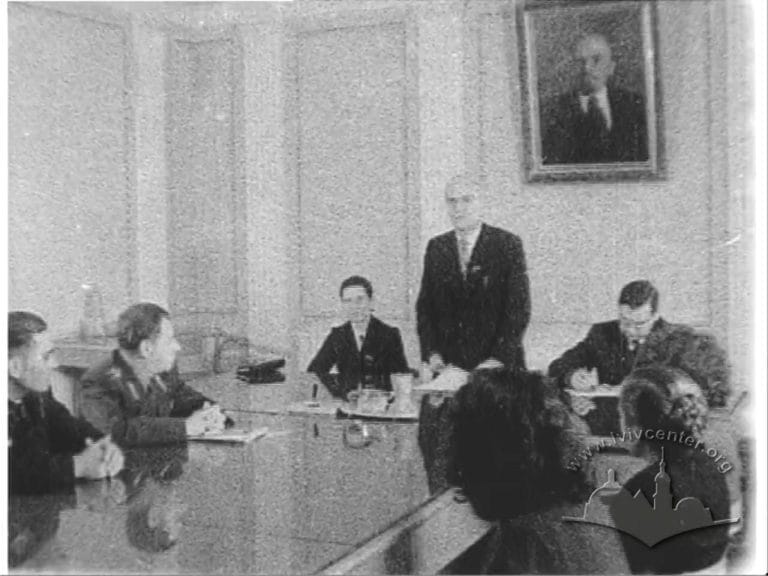DEAR COMRADE SHKIRYATOV,
We, a group of instructors and deputy heads of departments of the Kharkiv Oblast Committee of the CP(b)U, declare with full responsibility that we speak on behalf of all instructors of the Oblast Committee of the CP(b)U. We urgently request your assistance in resolving our extremely difficult financial situation.
There is no doubt that the CP(b)U Oblast Committee selects honest, loyal, modest, and sensitive communists, most of whom are family-oriented and possess higher education. This is evident in the composition of the Kharkiv Oblast Committee of the CP(b)U. We work tirelessly, day and night, always ready to fulfill any task assigned by the bureau of the regional committee or the Central Committee. Frankly, we have put our personal lives aside, dedicating all our time to work, both at the office and in the districts of the oblast.
Party work is our calling, and we are proud to carry it out. However, our extremely difficult financial situation overshadows our lives and diminishes our motivation for work. As a result, instead of focusing on our tasks, we are preoccupied with concerns about how to make ends meet.
For department heads, this issue is well addressed: They receive substantial subsidies, making their combined income three times higher than ours.
We consider this situation to be a grave injustice, a clear case of discrimination, which could have serious repercussions. It has created significant resentment between those who receive subsidies and those who do not, which negatively affects our work. We see this very clearly, and we believe that if you understand our concerns, you will agree that such discrimination is highly detrimental.
In reality, we often work as much as, if not more than, department heads, yet our wages are far lower. We struggle to maintain even the most modest standard of living. To make matters worse, we are forced to rely on the open market for basic necessities, as no provisions have been made to ensure that we can purchase essential goods in stores. While a shop was initially established for Oblast Committee workers, it was shut down by Churaev, who insisted that we join the general queue. This is outrageous!
Taking advantage of our hardships, economic planners offer to buy us the necessary products from their DWSs.
Unfortunately, many of our colleagues have no choice but to accept these offers despite the humiliation it brings to their personal dignity as party workers.
We are confident that you will understand our position, as we have only one interest in mind—the interests of the Party. When our authority and dignity are diminished, we inadvertently undermine the authority of the Party itself.
We have chosen not to sign this statement, as it would carry too many signatures.
Note:
* DWS – department of working supply (Russian: отдел рабочего снабжения) – departments for the provision of goods and services, i.e., sectoral bodies for supplying employees with the necessary things outside of state trade.



In January 1948, after the introduction of temporary allowances, a privileged subset of staff within central, regional, and oblast government centers emerged, leading to greater internal differentiation. Despite some secrecy surrounding the arrangement, information about the financial privileges leaked, causing frustration among other party members. Upon discovering the significant disparities in salaries, a group of apparatchiks from the Kharkiv Oblast Committee of the CP(b)U appealed to the Party Control Commission of the Central Committee of the CPSU, a body seen as a fair arbiter within the party.
Interestingly, the appeal was directed to Moscow, bypassing Kyiv, where such a complaint should have been addressed according to the established hierarchy. This choice suggests that the anonymous authors (or possibly a single author) feared potential repercussions from appealing directly to the Ukrainian Central Committee as in the appeal they criticized V. Churaev, the first secretary of the Kharkiv Oblast Committee. According to an unwritten bureaucratic tradition, the appeal could have been passed to Churaev himself for consideration or he could have influenced the Central Committee inspectors to leave everything unchanged or sought to identify the authors. Instead, the decision to appeal directly to the Party Control Commission of the CPSU(b) in Moscow offered a greater chance for a favorable review, even though the Commission’s role was primarily to oversee party discipline and address violations.
The letter serves as a compelling example of how citizens appealed to authorities during Soviet times. The authors professed their political loyalty, outlined their grievances, and emphasized the widespread dissatisfaction and negative consequences of the financial disparities. Unfortunately, the outcome of the appeal remains unknown, but it is assumed that its effectiveness was limited. A positive response could have undermined the authority of the oblast committee’s first secretary and potentially encouraged further appeals to higher party bodies in search of justice.